#marysia i napoleon
Text
Napoleon dancing near Berthier
An anecdote about Napoleon from a collection of Polish soldiers memories:
"Do you know, madame," said the emperor to his partner at the moment of rest, "why do I always put Berthier opposite me in the dance? I do it by coquetry: he dances like a bear, and so I seem a little better than him."
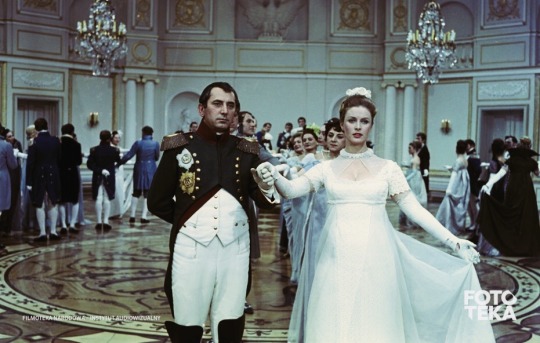
A screenshot from the movie “Marysia i Napoleon” from here
67 notes
·
View notes
Text
The promo posters for Marysia i Napoleon (1966) were out of control


(Source)
#graphic design is my passion#😂😂😂😂#Napoleon and Marie walewska#napoleonic#Napoleon#Marie walewska#napoleonic era#napoleon bonaparte#history#France#film#vintage#vintage film#frev#french revolution#1800s#19th century#graphic design#movies#cinema#Polish cinema#vintage cinema#films
22 notes
·
View notes
Text
Józef Poniatowski’s depiction in movies
Part II. In the films about Napoleon-Walewska
1. This most known Polish movie on the topic is, of course, “Marysia i Napoleon” (“Maria and Napoleon”).
And prince Józef was played there by Zdzisław Maklakiewicz:
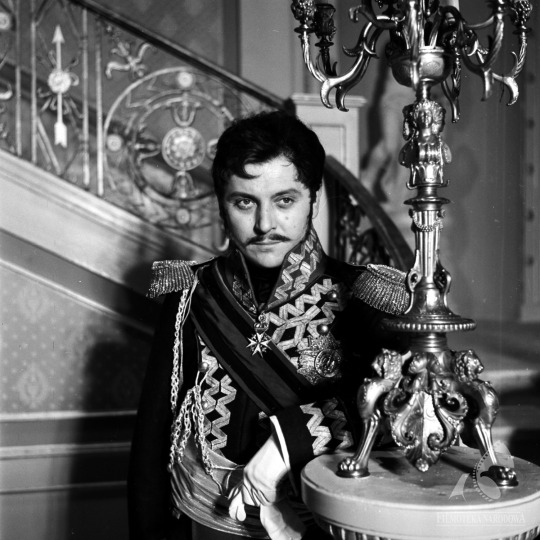
And do not let this black-and-white image confuse you, this movie, though made in 1966, was colorful! But the DVD with it I have is of such a poor quality (a screenshot from it can be seen, for example, in this post) that I prefer to look for better photos from Internet whenever possible.
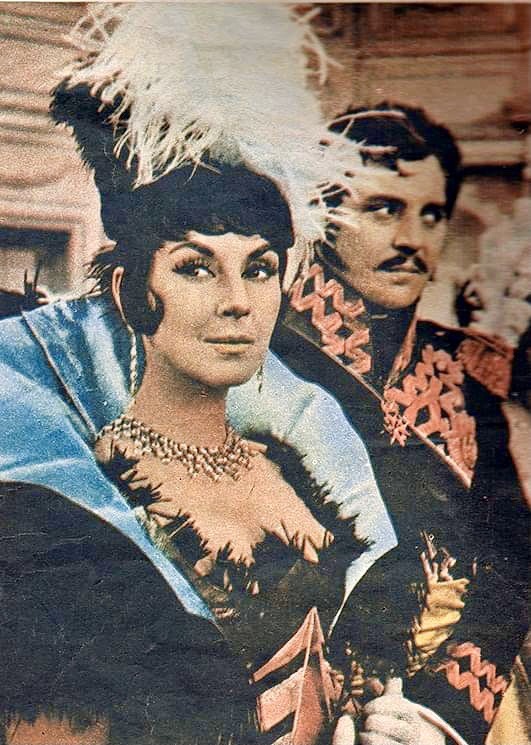
Pepi with Henriette de Vauban (played by Ewa Berger-Jankowska)
Strangely, but this movie is also available on YouTube (and even in the quality better than on my DVD), but… with only Russian audiotrack (good for you, @tairin) and… with some scenes cut (( And among them, unfortunately, is the one with prince Józef - where ladies ask him to persuade Walewska to give in to Napoleon.
2. Next item in this list will be an episode of the joint French-Polish TV-series “Napoléon et l’Europe”. The episode under the name “Marie Walewska”. (A friend of mine, who was lucky enough to watch this series on TV, told me that she remembered that prince Józef’s death was also shown there, but judging the information in the Internet Poniatowski appeared there only in one episode.) And he was played by Daniel Olbrychski:
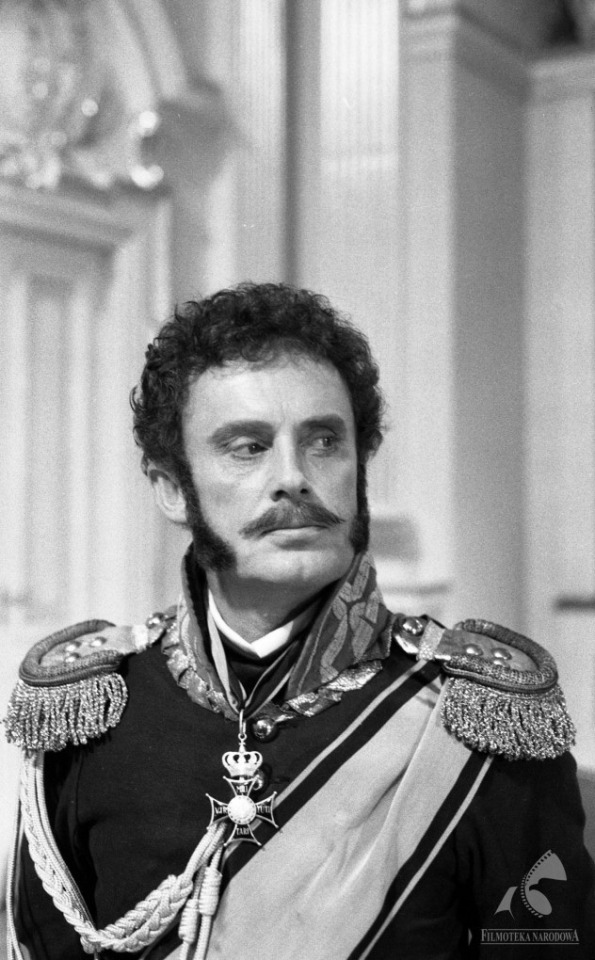
And yes, this tv-series made in 1991 was of course colorful. But because it’s neither in my collection and nor can be found in the Internet the only thing I am able to show you are these photos from the Polish National Film Archive.

Daniel Olbrychski with Jean-François Stévenin (Napoleon)
And if you, by lucky chance, know where can this tv-series be bought or watched - please-please-please, let me know! (Even if it is on VHS, not DVD)

Daniel Olbrychski with Joanna Szczepkowska (Marie Walewska)
And speaking of Olbrychski - “Napoléon et l’Europe” wasn’t the first time he “played” Poniatowski. Because in 1980 in Kraków, as part of the "Krakow Day", the "entry of Prince Józef Poniatowski to Krakow in 1809" was recreated. And in this show prince Józef was portrayed by Daniel Olbrychski.
3. Prince Poniatowski also appears in such a Hollywood classics as “Conquest” (also known as „Marie Walewska”).
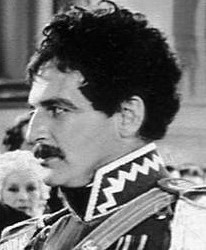
C. Henry Gordon as prince Józef
And though the actor’s make-up has some flows (like side whiskers’ absence etc), and during the whole movie he utters only a couple of sentences, I was still very glad to see him here.

A screenshot from the movie. Poniatowski - on the left, in the middle - Maria Walewska (Greta Garbo).
And if you’d like to watch the movie, it can be found, for example, here on YouTube.
What else is left? Unfortunately, dear friends, the rest of the images will be just actors photos, without any make-up etc. So you’ll have to turn on your fantasy to imagine how they might have looked like playing prince Józef ))
4. In 1914 there was produced a joint Polish-French silent movie called “Bóg Wojny” („The God of War”, also known as „Pani Walewska”). Józef Ponitowski was played there by Bronisław Oranowski:

Bronisław Oranowski
5. 6 years later, in 1920 in Germany, the love story between the Emperor of the Frenchmen and a Polish countess was filmed again, under the title “Gräfin Walewska” (“The countess Walewska”). Prince Poniatowski was portrayed there by Leopold von Ledebur:

Leopold von Ledebur
Unfortunately, neither first nor second silent movies survived till our times…
6. And the last item of this list will be a British TV-series of 1974, devoted to Napoleon’s women - “Napoleon and Love”. In the episode “Maria Walewska” prince Poniatowski was played by Vladek (Władysław) Sheybal.

Vladek Sheybal
I haven’t seen this movie either, so if you know where can it be watched - please let me know!
#poniatowski#józef poniatowski in cinema#józef poniatowski#marysia i napoleon#zdzisław makłakiewicz#napoléon et l’europe#daniel olbrychski#conquest#c. henry gordon#bóg wojny#bronisław oranowski#gräfin walewska#pani walewska#countess walewska#Leopold von Ledebur#napoleon and love#maria walewska#vladek sheybal
18 notes
·
View notes
Note
Hello, I've scrolled through your blog to make sure, this question wasn't asked before, but it would seem that it wasn't (though I could've missed it). Can I please ask you of prince Poniatowski's attitude towards Napoleon?
No, this question has not been asked yet, and thank you very much for sending it! It will be my please to write a answer to this.
Relationship between prince Józef Poniatowski and the emperor Napoleon Bonapart
I am sorry, this turned out to be a very long read, and on the topic a little bit wider than asked, so I had to specify the title and give the short answer for those who aren’t interested in details.
So in brief - Poniatowski respected Napoleon, but wasn’t a blind worshipper of the emperor. And in situations when in the balance there might have been Napoleon and Poland, and only one thing was to be chosen for prince Józef this one definitely would be his motherland.

Bronisław Gembarzewski, prince Józef and Napoleon
Emperor Napoleon, as all fans of the epoch knows, first arrived to Warsaw in December of 1806. But to start the long-read about relationship between the emperor and the prince properly we need make a step backwards, to understand what these two thought about each other on the moment of their first meeting.
Prince Józef, in comparison with many of his country men, participated in none of general Bonapart’s campaigns. What’s more - when the count of Provence, future king Louis XVIII resided in Warsaw in 1801-1804 he was an often visitor of Poniatowski’s palace. (So it may be said that before 1806 prince Józef was kind of a “royalist”.)
However, with Napoleon’s victory over Prussia and the emperor’s arrival to the former Polish lands chances of Poland rising from the dead skyrocketed! And prince Józef realized that he couldn’t have stayed away any longer, that if he wanted to participate in his motherland reappearing on the map of Europe he had to join the French.
As for Napoleon - in 1806 the emperor of Frenchmen didn’t have any warm feeling towards the nephew of the last king of Poland. One of the reason was that Claude Carloman de Rulhière, with whose book Histoire de l’anarchie de Pologne Napoleon had studied history of lands he was going conquer, wasn’t sympnathising the Poniatowski family. As other reasons there may be named a fact, that that time in French Army there were other Poles, whom the emperor knew better, like generals Jan Henryk Dąbrowski and Józef Zajączek.
Nevertheless, because when leaving Warsaw the Prussians kinda left the city “in charge” of Poniatowski, Napoleon had to meet prince Józef on entering the city. And from the data I was able to find it looks like the first meeting of the emperor and the prince happened on the 19th of December.

Prince Józef with Napoleon during the war campaign - drawing by Wacław Lipiński
With this image I am obliged to make a small digression. Napoleon, as recent investigation show, was not that short as he was thought to be because of English cartoons. Józef Poniatowski, on the other hand, was described by the contemporaries as a man of the middle height. So, in my opinion standing side-by-side these two must have looked like as people of the same height.
With the emperor so prejudiced against prince Józef, you may ask, how did it happen that less than a month later, on the 14th of January 1807, the latter was appointed as a Director of War? (In October of 1807, after the Duchy of Warsaw was created, Poniatowski’s post acquired the name of “Minister of War”.)
The answer is that behind the event there was a long and complicated intrigue, in which were involved such people as Joachim Murat (with whom, as you may remember, prince Józef quickly became friends) and Charles Maurice de Talleyrand, that time Foreign Minister of France. (As for the latter - his protection was asked by Pepi’s sister, Teresa Tyszkiewicz.)
And I can’t help but mention that Poniatowski’s nomination nevertheless had some advantages, because in comparison with his “rivals” he was a representative of the aristocracy, what might have provided support to Napoleon from the Polish high-society.
And speaking of high-society I can’t help touching a rather delicate topic, related with Napoleon’s love life, with which Poniatowski - in comparison with what is thought about him - had nothing to do. Yes, I mean the story of prince Józef (and other Polish dignitaries) supposedly forcing Maria Walewska to give in to the emperor in exchange for “Poland’s resurrection”.
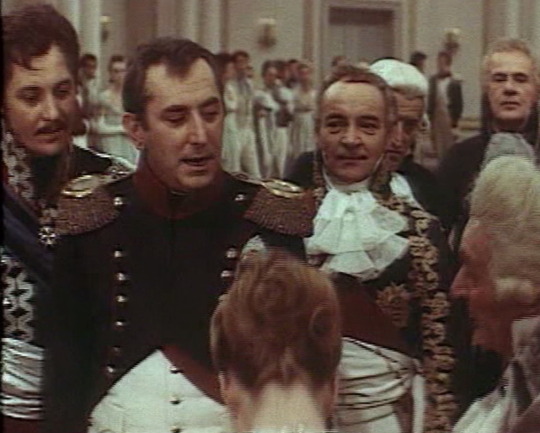
SCREENSHOT FROM THE MOVIE “MARYSIA I NAPOLEON”. From left to right - Zdzisław Makłakiewicz as prince Józef, Gustaw Holoubek as Napoleon, Beata Tyszkiewicz as Maria Walewska, Ignacy Machowski as Duroc, Kazimierz Rudzki as Talleyrand, Juliusz Łuszczewski as Anastazy Walewski
Many people believe in it because it is written in so-called Walewska’s memoirs, but the investigations of Polish historians (like, fir example, Marian Brandys) prove that not everything might have happened like it was described in the memoirs. And prince Poniatowski’s involvement in the story is one of the facts. (The closest connection he might have had with this is that Mme Henriette de Vauban, his mistress, might have tried to influence Mme Walewska. But this is definitely a topic to continue in - if at all - a separate post.
So, let’s return to relationship between Poniatowski and Napoleon.
In 1809 the Duchy of Warsaw was attacked by the Austrians, and the Army of the Duchy showed its combat strength, winning the war and taking back from the enemy a huge a part of former Polish territories. The emperor was impressed by prince Józef’s inferiors’ performance, till such a degree that he awarded the latter with the highest imperial order of merit, the cross of the Legion of Honour.
But this was done “by proxy”, and the next, after year 1807, meeting of these two happened only in 1811 in Paris, where Poniatowski was invited to attend the christening of Napoleon’s son, the king of Rome.
Prince Józef arrived to Paris on the 23rd of April, and in the evening of that very day received an invitation from the emperor to appear next day in Saint Clou. What’s more, Poniatowski’s visit was to be happen at once, without an obliged advance as the ceremony of representation by the Saxon ambassador.
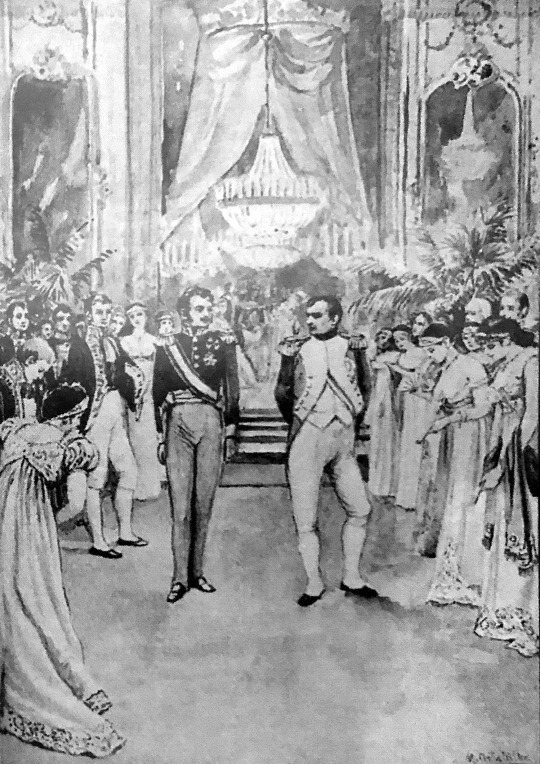
Prince Józef with Napoleon during the ceremonial audience at the Tuileries Palace - drawing by Maria Artwińska
And this is the image I like, because both - the prince and emperor - seem to have there the “correct” height!
Why was Napoleon so eager to see prince Józef? Well, at least because the latter brought with him news, which was dangerous to trust to paper. Namely - about planning Russian invasion of the Duchy and the tsar attempts to persuade the Polish Minister of War to switch sides and join the anti-napoleonic coalition. (Can’t help but mention there that Poniatowski revealed Napoleon mere facts, but not the names of the people communicating with him, in order not to put them in danger.)
And what about christening? Of course, prince Józef participated in the ceremony, and was even allowed to have an audience with the child-king. And, no doubts, there followed other court events, huntings, balls, etc. Old friend, Murat, and Poniatowski’s sister’s love interest, Talleyrand, introduced Pepi to the highest Parisian society. Also Pepi paid a visit to the ex-empress Josephine.

Prince Józef in conversation with Napoleon and the French Minister of Foreign Affairs, Talleyrand - drawing by Andrzej Zarzycki
And though initially prince Józef’s stay in the French capital was planned to be a couple of months, in fact it prolonged to four, till the emperor’s birthday. And leaving finally on the 27th of August Poniatowski received as a farewell gift a beautiful snuffbox planted with diamonds and a loan to… pay the debts of his sister Teresa.
And then there came the year 1812. Prince Józef was made the commander of the 5th Corps of the Grande Armée, and with the rest of the Army went to Russia.
However, above “The Polish corps” there was a commander not very competent and lucky, emperor’s younger brother Jérôme. And when it happened that the Russian Army under general Bagration managed to escape from the “second center” corps led by Jérôme, Napoleon blamed on this... prince Józef.
In the battle of Smolensk, however, the Vth Corps managed to distinguish to such a degree, that together with its commander it was mentioned in a bulletin of the Grande Armée.
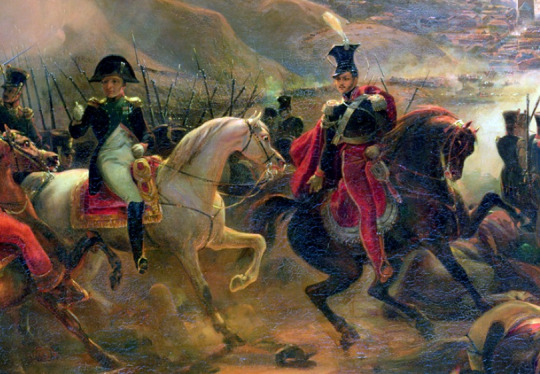
Jean-Charles Langlois, The Battle of Smolensk, 17th August 1812, detail
But after that battle there happened a very dramatic scene between the prince and the emperor. Because, as you might know, the city of Smolensk was the most eastern town ever belonged to Poland. So, if Napoleon’s goal was, as it had been proclaimed in the beginning of the war, to restore Poland, the Grande Armée should have stopped there, at Smolensk. Not to go further east.
And Poniatowski, as a witness of the scene, count Ostrowski, recalled, “begged Napoleon on his knees if not to direct the whole French Army to the south, to the former Polish lands, then at least to separated the Polish corps and send it along the Dnieper river, in the direction of Kiev...”
But emperor was implacable.
What happened next we all know. The battle of Moscow, fire, retreat…
In December Napoleon left his army and speeded to Paris. Prince Józef returned to Warsaw, to rebuild “the Polish corps”, to reenforce the people left with new conscripts and to be ready to join with these people the emperor. When the latter comes with fresh forces, to fight the coalition back.
But the emperor of French didn’t hurry to return to the East of Europe. Failing to wait him Poniatowski had to leave Warsaw, going with his soldiers to Kraków. And was waiting here, for almost three month.
To no avail.
At the beginning of May all the territory of the Duchy of Warsaw, except Kraków, was occupied by Russians. A lot of Polish officers, acquaintances and even friends of prince Józef, resigned from the army. A lot of them were persuading the Polish commander-in-chief to follow, to join the anti-napoleonic coalition.
And… well, here I can’t write that Poniatowski rejected these propositions, all and at once. No, he was listening, thinking over… Asking for terms and thoroughly pondering on what would have been better for his motherland - to stay with France or not.
And on the night from the 6th to the 7th of May, on the eve of his 50th birthday the decision was made.
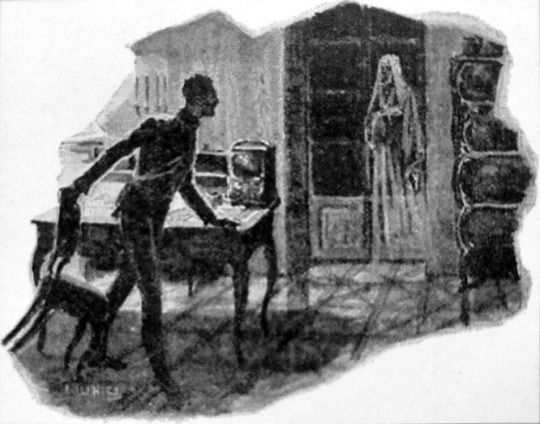
Prince Józef sees “the White Lady of the Poniatowski Family” on the night on 6/7 May 1813 in Krakow (drawing by Ludomir Ilinicz)
Having obtained no written guaranties from the other side, feeling that unconditional surrender - the only thing they were ready to accept from him - was not compatible with the soldier honor, the Polish Bayard decided to stay with Napoleon.
Although to make such a decision was for prince Józef extremely hard (especially if to take into account that he still had not got clear instructions from the emperor what to do). As Poniatowski confided next day to one of his colleagues that night thinking was so difficult to him that he even thought about shooting himself. Twice.
What is not proved - so this fact still stays a kind of legend - that that night prince Józef saw a ghost, the famous “White lady of Poniatowski family”. The fantom that was said to announce with its appearance very bad things to come…
And in 5 month there came… the battle of Leipzig.

Jean-Charles Langlois, The Battle of Leipzig (?)
This image is often signed as „the battle of Leipzig” though judging by the emperor’s, the prince’s and their horses’ poses I suppose it might be another version of “the battle of Smolensk”.
Of course, before Leipzig there was truce, then the battle of Dresden, then retreat and preparations. And in the beginning of the battle there was a moment when French victory still looked possible. But soon it turned out that it was an illusion.
And then the emperor… named general Poniatowski a marshal of France. Thus making him the only foreigner among that cream of French military elite.
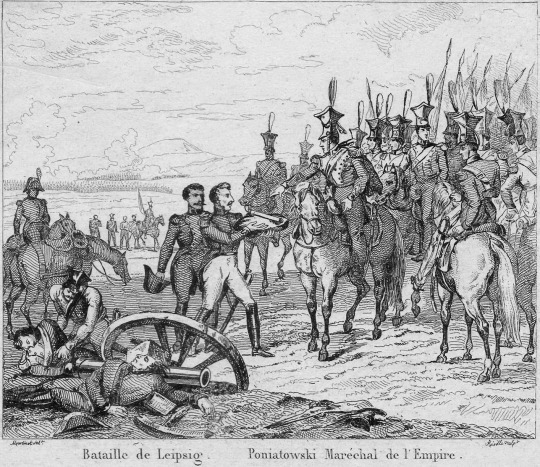
Prince Józef Poniatowski receives the marshal baton, French engraving from the XIXth century
How did Poniatowski react to such a promotion? Did he become happy? Or, at least, glad?
No, not at all. (It looks like he felt that this appointment has more with his future attachment to France, than with military achievements.)
So prince Józef continued to call himself a general, sign documents according his old position. Furthermore, in the written explanation that Poniatowski sent to Warsaw it was stated that “if there was not war for Poland, no one would ever see him in uniform”. Which literally meant resignation. (In the very same letter, though, prince Józef announced that before leaving the army he had to escort Napoleon back to Paris.)
So, dear friends, who was interested in what might have happened with prince Józef had he not been killed at Leipzig - this is the answer. He would definitely retreat with Napoleon to Paris, than resigned and… here the certainty is a little bit less, but something tells me that he would have preferred exile to going back home. But I am not one hundred percent sure.
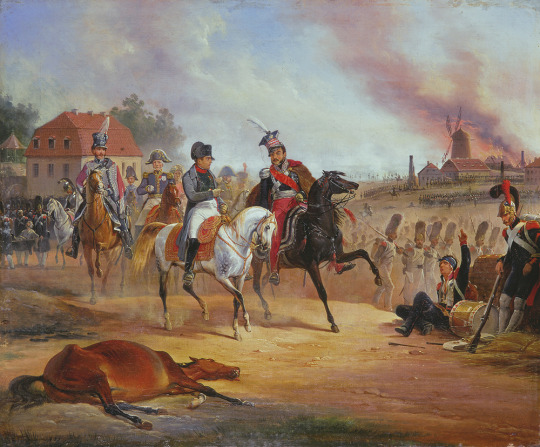
January Suchodolski, Napoleon and Józef Antoni Poniatowski at the Battle of Leipzig
And what about Napoleon? In his memories dictated on St. Helene he wrote that he should have made prince Józef the king of Poland (ha-ha, what would he have done if the latter rejected the crown?), regretted not doing this.
But what is, in my opinion, more interesting, is to learn what the ex-emperor thought on other Poniatowski-related topics? Did he regret blaming prince Józef for Jerome’s mistakes? Had he doubts on not listening the Polish commander’s pleas to take back former Polish land instead of going to Moscow?
Alas, I am afraid, this is a thing we’ll never know…
#józef poniatowski#napoleon#poniatowski#poniatowski and napoleon#charles maurice de talleyrand périgord
57 notes
·
View notes